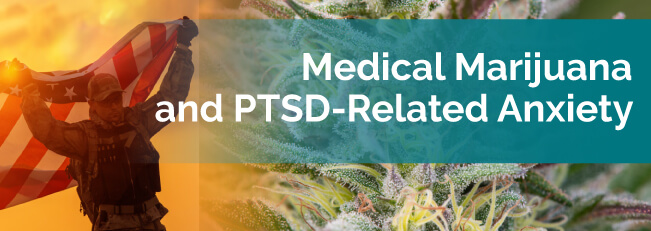
After a traumatic experience, it’s common for feelings of stress or anxiety to develop. If these feelings grow more severe and prolonged, you may have post-traumatic stress disorder (PTSD). This condition affects nearly 8 million people in America alone.
There are treatments available for PTSD-related anxiety — both therapy and medications. But for some patients, these don’t work, and they’re left to manage their symptoms on their own. Many turn to self-medicating and abuse both drugs and alcohol.
There’s promising evidence medical marijuana could be what these people need to cope with anxiety caused by PTSD. Some states have approved the disorder for cannabis use in their medical marijuana programs, but many haven’t. Advocacy groups continue to lobby for the legalization of medical marijuana for PTSD patients.
PTSD is a severe anxiety disorder caused by an injury or a serious psychological shock. Sufferers continually feel like they’re under attack or at risk, even when no danger is present. Those with this condition can recover in a short amount of time, but many struggle with PTSD for years.
The symptoms associated with PTSD are usually broken up into four main categories:
People can develop PTSD-related anxiety when they experience a dangerous event, have a scary experience or suffer a shock. Some examples of this include:
However, the root of the anxiety caused by post-traumatic stress disorder may have a more scientific explanation. People with PTSD have lower levels of a neurotransmitter called anandamide. These are used to activate cannabinoid receptors, which work to suppress negative memories and thus lower feelings of anxiety. Low levels of anandamide impair this function, causing higher levels of anxiety.
For decades, people with post-traumatic stress disorder, especially veterans, have been self-medicating with pot. Many have considered this a form of substance abuse, like alcoholism. However, new studies are showing that medical marijuana may benefit those with PTSD.
The cannabinoids THC (tetrahydrocannabinol) and CBD (cannabidiol) found in cannabis can activate the same cannabinoid receptors as anandamide, meaning feelings of anxiety can be treated with medical marijuana.
Marijuana high in THC can potentially increase feelings of anxiety in those with PTSD. But there are strains of medical marijuana that have equal levels of CBD and THC. These can help those struggling with anxiety by providing a calming effect and quelling memories.
The best strains for PTSD-related anxiety provide a calming effect without supercharging the mind. The goal is to ease the painful memories and help patients relax. Some of the best strains for this are:
Availability at your dispensary may vary, but most are willing to start stocking a certain strain if you request it. Make an appointment with a marijuana doctor for more information.


Please allow us to access your location to find local dispensaries.
VIEW ALL DISPENSARIES ➔